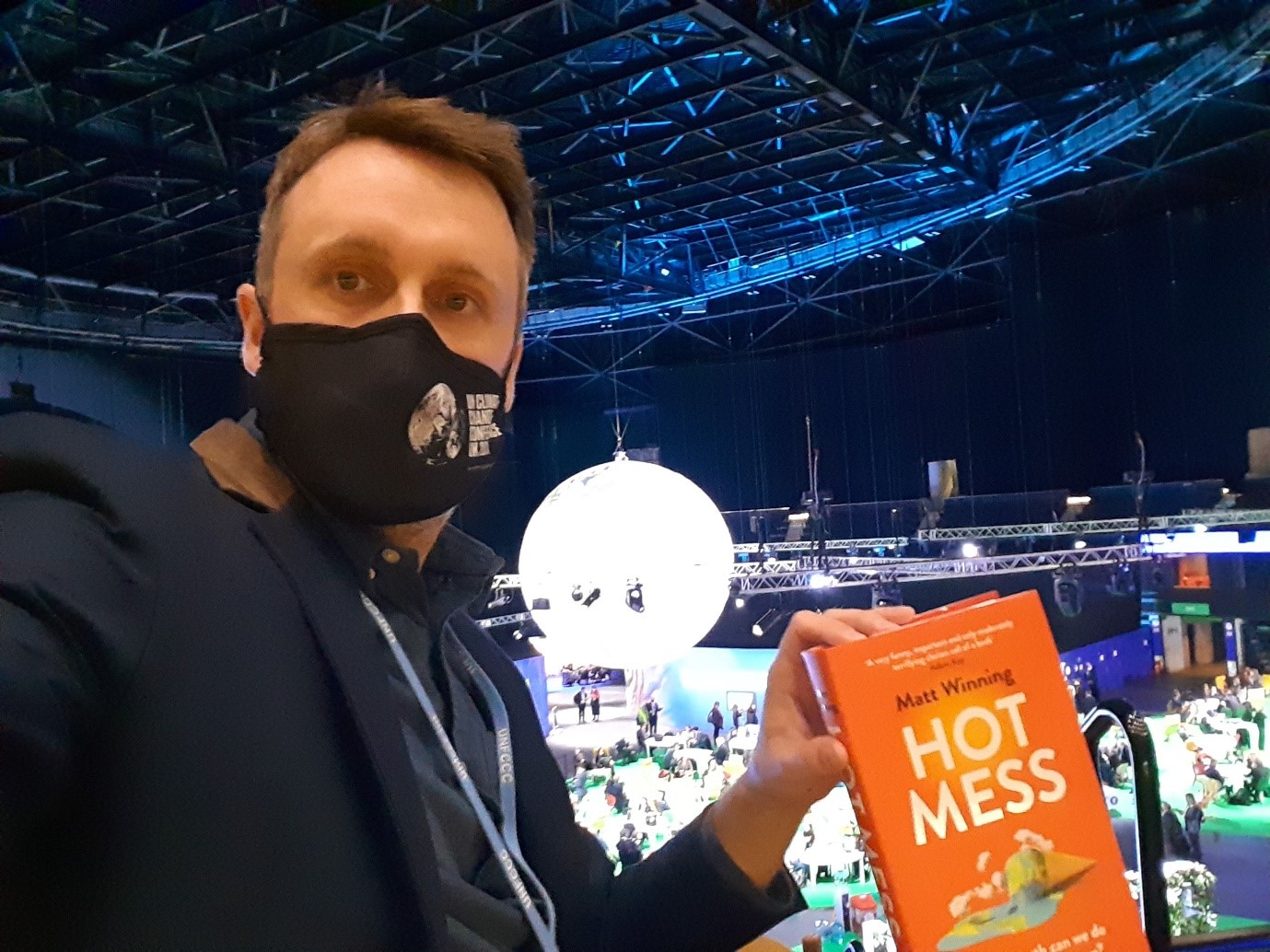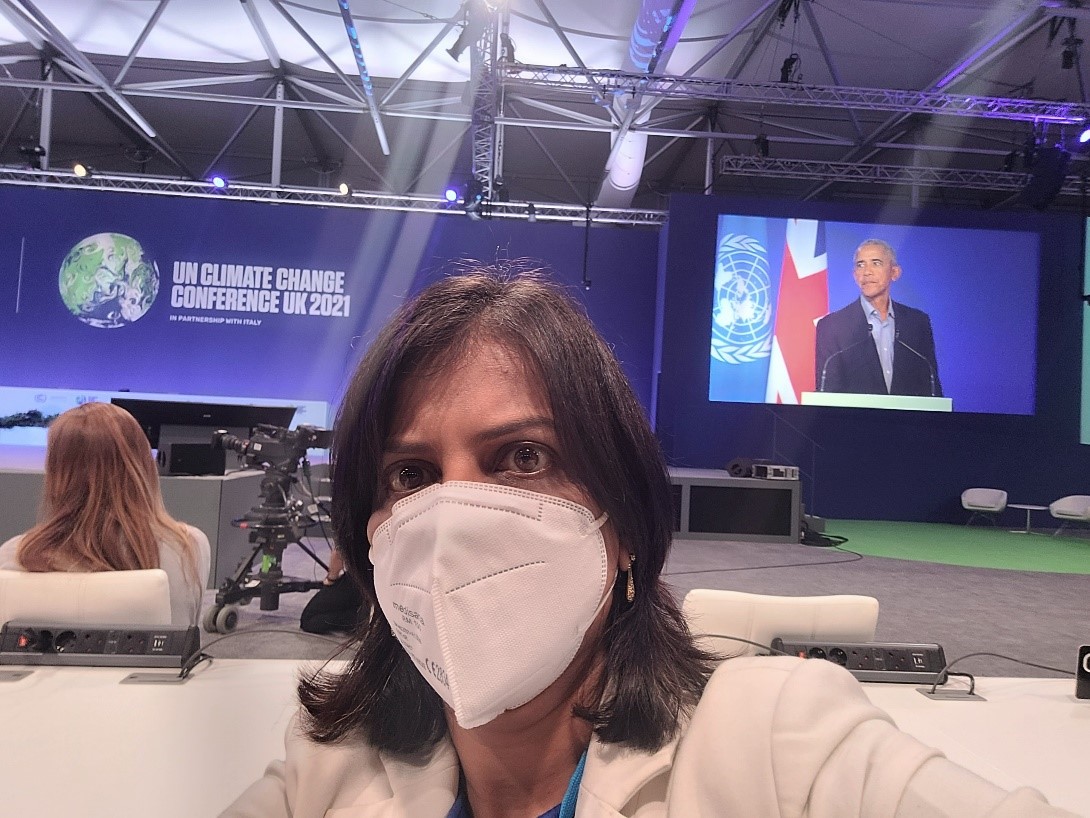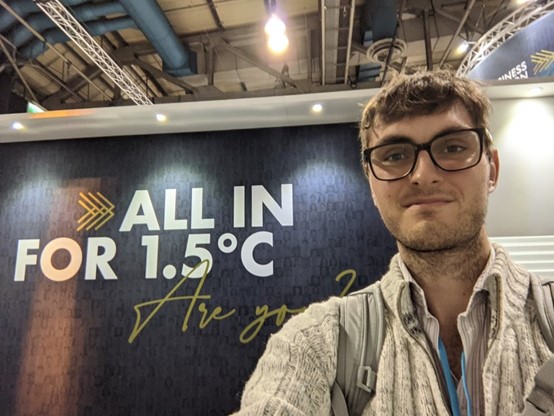In November 2021, after a brief delay due to the pandemic, COP26 was hosted in Glasgow. Catch up with some of the UCL team and hear more about how their research is influencing climate debate
Academic Institutions such as UCL, play a critical role in influencing decision-makers to implement effective climate change policies. Our researchers and academics stand at the core of UK and global climate research.
Joining the UCL COP team is an exciting chance to interact with a variety of colleagues, policymakers and stakeholders united around climate change discussion. COP provides a chance to learn, network, influence and share research, with lasting impact for those who attend. However, don’t just take our word for it, here are the experiences of three of our COP26 UCL attendees:
Dr Matthew Winning, Senior Research Associate at the UCL Institute for Sustainable Resources
Matt has a background in environmental economics, focussing on economic analysis, often in the form of macroeconomic modelling and energy system modelling, on the subjects of climate policy, green growth, the circular economy, climate finance and low-carbon transitions. Alongside this, he is also involved in many public engagement activities and uses humour to communicate climate change – culminating in performances at Edinburgh Fringe Festival, a TEDx talk and his own BBC Radio 4 show Seriously, Though, The Planet co-hosted with Mark Watson (BBC Radio 4). His debut book Hot Mess: What On Earth Can We Do About Climate Change was released in November 2021.
Having always been intrigued by the process, but never having managed to attend previously, COP26 was Matt’s first time at COP – and what better way to experience this than in your hometown of Glasgow.
 What were your main reasons/interests in attending COP?
What were your main reasons/interests in attending COP?
With it being in the UK last year I was very keen to be part of the COP activities since it was on our doorstep. I hoped to use it to learn about the COP process, and make connections, particularly with regards to finance and the circular economy. It was also a chance to develop my work on communicating climate change as I had just spent a year writing a book.
What were your COP26 highlights?
COP26 was a massive learning experience, there was the chance to meet people from across the entire world who work on climate issues and the experience felt far more like attending a festival than I imagined. Highlights included: attending a plenary on coal phase-out, various media appearances on Sky, BBC and Times Radio, and playing a charity football match.
How has attending COP helped or influenced your research?
Since COP26 I think my research has become even more interdisciplinary. Specifically, I have received some discipline hopping funding via NERC to produce a short handbook on communicating climate change which we will publish in the lead up to COP27. This aims to help UCL staff who communicate climate change in some way - whether to the media, public or policymakers - by providing top tips, examples and who to speak to for help at UCL.
Dr Priti Parikh, Associate Professor at the Bartlett School of Sustainable Construction
Priti’s expertise has strong linkages to the UN Sustainable Development Goals, covering water, sanitation and energy infrastructure provision for resource constrained settings, seeing first-hand how infrastructure can transform living conditions in slums and villages around the world. Priti has substantial industry experience in India, South Asia, Africa and the UK, working with local governments and slum communities and has led multi- sectoral projects at both city and community scale. Priti has been awarded a prestigious five year Senior Research fellowship co-funded by industry (BBOXX) and Royal Academy of Engineering. The fellowship titled Smart Solar Solutions for all (S34ALL) will focus on resource challenged communities combining machine learning based models with consumer surveys. In addition to this, Priti set up and now leads the Engineering for International Development Research Centre, she is Chair of the Editorial Panel for ICE's Engineering Sustainability Journal and in 2019 was recognised as an Engineers Without Borders Changemaker.
Struck by the convening power of COP as a global movement to tackle climate change, COP26 was Priti’s first time attending COP.
 What were your main reasons/interests in attending COP?
What were your main reasons/interests in attending COP?
Over the last twenty years I have worked on infrastructure gaps globally through my research. Vulnerable and marginalised communities bear the double burden of poor infrastructure and climate. I wanted to attend COP to showcase those issues and form partnerships to tackle existing vulnerabilities from the lens of climate change.
What were your COP26 highlights?
My first highlight was an opportunity to listen to Barack Obama’s take and his work on climate change and climate justice. Second highlights were the sessions on adaptation, which is now becoming mainstream in climate talks. I was stuck by the differences in priorities of developing nations versus developed countries which is linked to growing interest in climate adaptation funds.
How has attending COP helped or influenced your research?
On the back of my participation at COP26 and thanks to funding from Grand Challenges myself and a group of UCL academics are developing a carbon footprint tool for travel to COP27. This will be hosted on UCL’s Climate Hub in September and enable academics travelling to COP27 make more informed travel choices. In addition, we will be publishing a paper to highlight climate justice issues for Africa based on our collective experience from COP26.
Robbie Mallett, Early Career Researcher, with the London NERC DTP based at the Centre for Polar Observation
Robbie Mallett is a PhD researcher with the London NERC DTP based at the Centre for Polar Observation (Department of Earth Sciences) specialising in detection and modelling snow and its effects on Arctic sea ice. Robbie’s PhD focuses on investigating the properties and distribution of snow using satellite remote sensing and models on many different scales – something which is poorly understood, but critical in determining how much sea ice will shrink as the world warms.
As an early career researcher, Robbie was keen to attend his first COP and became involved with the running of the Cryosphere Pavilion, including giving two talks - one on sea ice and permafrost, and the other on IPCC model projections of sea ice decline.
 What were your main reasons/interests in attending COP?
What were your main reasons/interests in attending COP?
I wanted to meet internationally renowned scientists with policy influence and have a chance to engage with policymakers themselves and see how, or whether, their work was informed by science. Policymakers get a hard time of it because they ultimately can't put their plans into action if they don't get re-elected, so I wanted to hear their side of the story on why climate action has been historically slow. I was also keen to form links with NGO bodies like the International Cryosphere and Climate Initiative, and the Arctic Monitoring and Assessment Programme. Finally, I wanted to raise my own profile as an ECR.
What were your COP26 highlights?
As part of the Cryosphere Pavilion, I gave two talks in the blue zone, both in partnership (double-act) with senior scientists. I also had the chance to meet the next generation of top cryosphere and climate researchers and network with several leading scientists who I may work with in future.
How has attending COP helped or influenced your research?
Attending COP26 has helped me realise that policy-relevance has to be incorporated at the scoping stage of research. You should actively design your study to be policy-relevant, rather than trying to work policy-relevance into your findings. Joining the UCL group and meeting others at COP26 has helped my network to grow. This gives me the ability to dash off a quick email to an expert with a technical question where I wasn't able to before. I actually did this the other day and received a super useful reply! COP26 has definitely raised my profile as a scientist: Research councils often have "policy or societal impact" as part of their proposal frameworks, and I can demonstrate a track record in that area.
You can find out more about UCL's COP26 team via the dedicated pages on the Climate Hub Website.
 Close
Close

